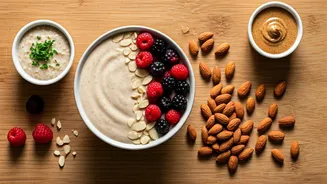Introduction: Heart-Healthy Foods
Incorporating plant-based foods into your diet is a powerful step towards maintaining a healthy heart. These foods are packed with essential nutrients
and compounds that can improve arterial health and enhance blood circulation. This exploration will identify five key plant-based options readily available, showcasing their benefits and providing practical advice on integrating them into your meals to promote cardiovascular wellness. Prioritizing heart health should include a careful selection of food to ensure the heart remains healthy.
Leafy Green Powerhouses
Leafy green vegetables, such as spinach and kale, are nutritional powerhouses for heart health. They are rich in nitrates, which the body converts into nitric oxide. Nitric oxide helps relax and widen blood vessels, which improves blood flow and lowers blood pressure. Additionally, leafy greens contain vital vitamins, minerals, and antioxidants that protect the heart from damage. Consuming these greens regularly can contribute to a healthier cardiovascular system by improving arterial function and offering protective elements. A diet rich in leafy greens will supply the necessary elements the heart needs to function properly.
Berries for Circulation
Berries, including strawberries, blueberries, and raspberries, are packed with antioxidants, specifically anthocyanins, which can improve heart health and circulation. These compounds help protect blood vessels from damage and reduce inflammation. Regular consumption of berries has been linked to lower blood pressure and improved arterial function. The antioxidants in berries combat oxidative stress, thereby improving blood vessel elasticity and overall heart health. Making berries a regular part of your diet provides a delicious way to support your heart's well-being and enhance circulation. Berries can also be incorporated into different meals to diversify the way it is consumed.
Avocados for Healthy Fats
Avocados are a source of monounsaturated fats, which are beneficial for heart health. These fats can help lower bad cholesterol levels (LDL) and raise good cholesterol levels (HDL). They also contain potassium, an essential mineral for regulating blood pressure. Regular avocado intake supports healthy blood vessels and reduces the risk of heart disease. The unique combination of nutrients in avocados provides essential support for cardiovascular health. Incorporating avocados into your diet is a delicious way to maintain a healthy heart. They are also easy to consume as they can be incorporated into different meals to improve taste.
Nuts and Seeds Benefits
Nuts and seeds, such as almonds, walnuts, flaxseeds, and chia seeds, contribute to heart health in several ways. They are rich in fiber, which helps lower cholesterol levels, and also contain omega-3 fatty acids, which reduce inflammation and improve blood vessel function. Consuming nuts and seeds can improve blood pressure and decrease the risk of heart disease. These foods provide essential vitamins, minerals, and healthy fats that are crucial for cardiovascular well-being. Adding a variety of nuts and seeds to your daily diet is an easy way to support a healthy heart. They are easy to find and can be mixed into a variety of meals and snacks.
Legumes for Fiber
Legumes, including beans, lentils, and peas, are excellent sources of soluble fiber, which helps lower cholesterol levels. They also provide protein and various essential nutrients, contributing to overall heart health. Eating legumes regularly has been associated with improved blood pressure and a reduced risk of heart disease. Their high fiber content promotes healthy arteries and ensures efficient blood flow. Incorporating legumes into your diet not only boosts heart health but also adds diversity and flavor to your meals. These are important food sources that should be included in every diet for a healthier heart. They also provide other essential nutrients that contribute to overall health.




















